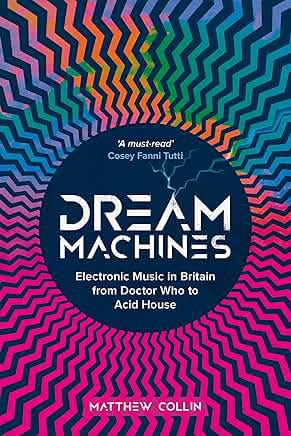Book Review: Dream Machines by Matthew Collin
Electronic Music in Britain from Doctor Who to Acid House
Back in the mid nineties, I helped research Matthew Collin’s first book Altered State, about the impact of Ecstasy culture on Britain. A landmark publication. And in fact it was Matthew who gave me my first break in journalism, along with Avril Mair, when I did work experience at i-D magazine (of which he was editor at the time) back in 1993. For which I will always be grateful.
Despite Matthew having written some interesting and important books over the years, there is an argument that Dream Machines is his masterstroke and magnum opus. A ‘forensically researched history’ (according to Stephen Mallinder of Cabaret Voltaire) and an engagingly and descriptively written one at that, with many political, social and cultural observations implicit and explicit.
It may come as a surprise to learn that women, were at the forefront of the early development of electronic music here in Britain. Notably Daphne Oram with her Oramics machine, Janet Beat and Delia Derbyshire - the latter the creator of the iconic Doctor Who theme tune at the BBC’s hallowed Radiophonic Workshop.
Gay men too, made important strides in electronic music in the 1980s. Just think of the important pro LGBTQ+ impact of synth pop outfits Soft Cell, Frankie Goes To Hollywood and Bronski Beat, not to mention the Hi NRG innovations of Ian Levine.
And the Black British community were long time innovators in the genre, with their sonically mind blowing dub sound systems and electro and hip hop productions.
Thus there is a very strong social history element to this book, telling the stories of marginalised and oppressed groups in society, to some extent, as well as of the music itself. Matthew has always had a finely tuned political radar.
Thankfully, whilst the major tech innovations are covered, eg the arrival of the Fairlight in the 80s, this is not a technical manual, I am woefully luddite in my grasp of technology and developments were fairly easy to comprehend even for me and not overly elaborated on.
This is also a fearless book with several chapters on Industrial music and Noise music that almost feel anthropological with their study of atavistic creators such as Throbbing Gristle, Whitehouse and Coil. Making explicit their anti social obsessions with scatology, serial killers, Nazis, hardcore pornography and the occult, which could be dark and forbidding for even the most open minded of commentators.
When the cover blurb observes that electronic music was ‘initiated by visionary artists, maverick, technicians, non conformist composers and bohemian freaks’ it is not wrong!
Meanwhile there are also some great revelations that the music at the very epicentre of the 60s rock canon - The Beatles, The Stones and Pink Floyd, was incorporating experimental electronic technology and techniques. Which perhaps underlines just why it is so deserving of its canonical status.
What’s more there are some great anecdotes within all of this. My absolute favourite being Mark Moore of S’Express taking modern classical composer Phillip Glass out raving in the late 80s and later on getting him to remix the S’Express single ‘Hey Music Lover’ - truly ingenious bit of cross fertilisation.
Perhaps the greatest accolade I can give to this book is that it made me want to listen to a lot of the music it documents. Best to have Spotify and You Tube to hand, whilst reading it!



